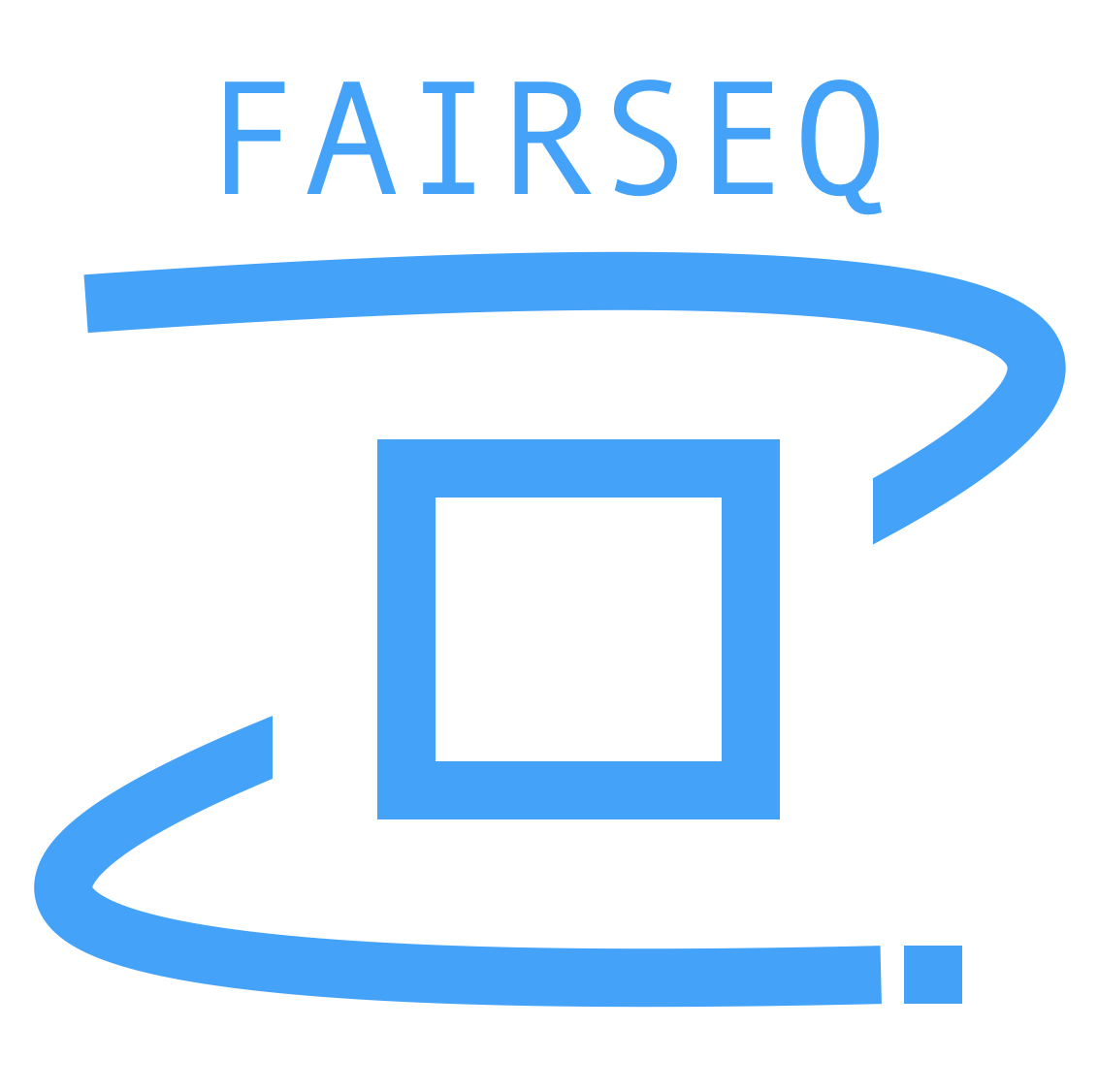Fairseq(-py) is a sequence modeling toolkit that allows researchers and developers to train custom models for translation, summarization, language modeling and other text generation tasks.
- November 2019: VizSeq released (a visual analysis toolkit for evaluating fairseq models)
- November 2019: CamemBERT model and code released
- November 2019: BART model and code released
- November 2019: XLM-R models and code released
- September 2019: Nonautoregressive translation code released
- August 2019: WMT'19 models released
- July 2019: fairseq relicensed under MIT license
- July 2019: RoBERTa models and code released
- June 2019: wav2vec models and code released
Fairseq provides reference implementations of various sequence-to-sequence models, including:
- Convolutional Neural Networks (CNN)
- Language Modeling with Gated Convolutional Networks (Dauphin et al., 2017)
- Convolutional Sequence to Sequence Learning (Gehring et al., 2017)
- Classical Structured Prediction Losses for Sequence to Sequence Learning (Edunov et al., 2018)
- Hierarchical Neural Story Generation (Fan et al., 2018)
- wav2vec: Unsupervised Pre-training for Speech Recognition (Schneider et al., 2019)
- LightConv and DynamicConv models
- Long Short-Term Memory (LSTM) networks
- Effective Approaches to Attention-based Neural Machine Translation (Luong et al., 2015)
- Transformer (self-attention) networks
- Attention Is All You Need (Vaswani et al., 2017)
- Scaling Neural Machine Translation (Ott et al., 2018)
- Understanding Back-Translation at Scale (Edunov et al., 2018)
- Adaptive Input Representations for Neural Language Modeling (Baevski and Auli, 2018)
- Mixture Models for Diverse Machine Translation: Tricks of the Trade (Shen et al., 2019)
- RoBERTa: A Robustly Optimized BERT Pretraining Approach (Liu et al., 2019)
- Facebook FAIR's WMT19 News Translation Task Submission (Ng et al., 2019)
- Jointly Learning to Align and Translate with Transformer Models (Garg et al., 2019)
- Non-autoregressive Transformers
- Non-Autoregressive Neural Machine Translation (Gu et al., 2017)
- Deterministic Non-Autoregressive Neural Sequence Modeling by Iterative Refinement (Lee et al. 2018)
- Insertion Transformer: Flexible Sequence Generation via Insertion Operations (Stern et al. 2019)
- Mask-Predict: Parallel Decoding of Conditional Masked Language Models (Ghazvininejad et al., 2019)
- Levenshtein Transformer (Gu et al., 2019)
Additionally:
- multi-GPU (distributed) training on one machine or across multiple machines
- fast generation on both CPU and GPU with multiple search algorithms implemented:
- beam search
- Diverse Beam Search (Vijayakumar et al., 2016)
- sampling (unconstrained, top-k and top-p/nucleus)
- large mini-batch training even on a single GPU via delayed updates
- mixed precision training (trains faster with less GPU memory on NVIDIA tensor cores)
- extensible: easily register new models, criterions, tasks, optimizers and learning rate schedulers
We also provide pre-trained models for translation and language modeling
with a convenient torch.hub interface:
en2de = torch.hub.load('pytorch/fairseq', 'transformer.wmt19.en-de.single_model')
en2de.translate('Hello world', beam=5)
# 'Hallo Welt'See the PyTorch Hub tutorials for translation and RoBERTa for more examples.
- PyTorch version >= 1.2.0
- Python version >= 3.6
- For training new models, you'll also need an NVIDIA GPU and NCCL
- For faster training install NVIDIA's apex library with the
--cuda_extoption
To install fairseq:
pip install fairseqOn MacOS:
CFLAGS="-stdlib=libc++" pip install fairseqIf you use Docker make sure to increase the shared memory size either with
--ipc=host or --shm-size as command line options to nvidia-docker run.
Installing from source
To install fairseq from source and develop locally:
git clone https://github.com/pytorch/fairseq
cd fairseq
pip install --editable .The full documentation contains instructions for getting started, training new models and extending fairseq with new model types and tasks.
We provide pre-trained models and pre-processed, binarized test sets for several tasks listed below, as well as example training and evaluation commands.
- Translation: convolutional and transformer models are available
- Language Modeling: convolutional and transformer models are available
- wav2vec: wav2vec large model is available
We also have more detailed READMEs to reproduce results from specific papers:
- Jointly Learning to Align and Translate with Transformer Models (Garg et al., 2019)
- Levenshtein Transformer (Gu et al., 2019)
- Facebook FAIR's WMT19 News Translation Task Submission (Ng et al., 2019)
- RoBERTa: A Robustly Optimized BERT Pretraining Approach (Liu et al., 2019)
- wav2vec: Unsupervised Pre-training for Speech Recognition (Schneider et al., 2019)
- Mixture Models for Diverse Machine Translation: Tricks of the Trade (Shen et al., 2019)
- Pay Less Attention with Lightweight and Dynamic Convolutions (Wu et al., 2019)
- Understanding Back-Translation at Scale (Edunov et al., 2018)
- Classical Structured Prediction Losses for Sequence to Sequence Learning (Edunov et al., 2018)
- Hierarchical Neural Story Generation (Fan et al., 2018)
- Scaling Neural Machine Translation (Ott et al., 2018)
- Convolutional Sequence to Sequence Learning (Gehring et al., 2017)
- Language Modeling with Gated Convolutional Networks (Dauphin et al., 2017)
- Facebook page: https://www.facebook.com/groups/fairseq.users
- Google group: https://groups.google.com/forum/#!forum/fairseq-users
fairseq(-py) is MIT-licensed. The license applies to the pre-trained models as well.
Please cite as:
@inproceedings{ott2019fairseq,
title = {fairseq: A Fast, Extensible Toolkit for Sequence Modeling},
author = {Myle Ott and Sergey Edunov and Alexei Baevski and Angela Fan and Sam Gross and Nathan Ng and David Grangier and Michael Auli},
booktitle = {Proceedings of NAACL-HLT 2019: Demonstrations},
year = {2019},
}


